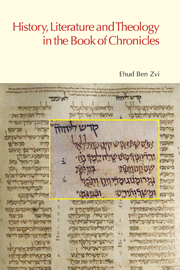Book contents
- Frontmatter
- Dedication
- Contents
- Acknowledgments
- Abbreviations
- Part I INTRODUCTORY ESSAYS
- Chapter 1 INTRODUCTION
- Chapter 2 THE BOOK OF CHRONICLES: ANOTHER LOOK
- Part II CHRONICLES AND THE REREADING AND WRITING OF A DIDACTIC, SOCIALIZING HISTORY
- Part III CHRONICLES AND THEOLOGY AS COMMUNICATED AND RECREATED THROUGH THE REREADING OF A HISTORIOGRAPHICAL, LITERARY WRITING
- Part IV CHRONICLES AND LITERATURE: LITERARY CHARACTERIZATIONS THAT CONVEY THEOLOGICAL WORLDVIEWS AND SHAPE STORIES ABOUT THE PAST
- Bibliography
- Index of Biblical Works Cited
- Index of Authors and Individuals Cited
Chapter 2 - THE BOOK OF CHRONICLES: ANOTHER LOOK
from Part I - INTRODUCTORY ESSAYS
- Frontmatter
- Dedication
- Contents
- Acknowledgments
- Abbreviations
- Part I INTRODUCTORY ESSAYS
- Chapter 1 INTRODUCTION
- Chapter 2 THE BOOK OF CHRONICLES: ANOTHER LOOK
- Part II CHRONICLES AND THE REREADING AND WRITING OF A DIDACTIC, SOCIALIZING HISTORY
- Part III CHRONICLES AND THEOLOGY AS COMMUNICATED AND RECREATED THROUGH THE REREADING OF A HISTORIOGRAPHICAL, LITERARY WRITING
- Part IV CHRONICLES AND LITERATURE: LITERARY CHARACTERIZATIONS THAT CONVEY THEOLOGICAL WORLDVIEWS AND SHAPE STORIES ABOUT THE PAST
- Bibliography
- Index of Biblical Works Cited
- Index of Authors and Individuals Cited
Summary
1. Introduction
Today I would like to invite you to take another and more balanced look at the Book of Chronicles, to read and reread it, to see beyond its apparent and misleading simplicity, and to consider or reconsider its potential as an area of academic research or interest. I am doing so fully aware of the bad PR that has accompanied this book for centuries. Even today, despite the recent efforts and contributions of a relatively small group of scholars, including some members of our society (i.e., the CSBS), the book is considered more often than not as, at best, of peripheral importance from historical, literary or theological perspectives. The book is often described as being boring, inferior to other biblical narrative works – never mind to books such as Isaiah or Hosea. It is often characterized as being theologically or ideologically flat, and of lesser value as a historiographical work, not only in comparison with Greek historiography, but also, and mainly, in comparison with the deuteronomistic historiographical works. Many colleagues among those who do not work on Chronicles still identify with the words of Baruch Spinoza, more than three centuries ago, at the beginning of the critical study of the Bible, ‘I have always been astonished that they [the books of Chronicles] have been included in the Bible by men who shut out from the canon the books of Wisdom, Tobit, and the others styled apocryphal’ (TPT, II, 10.5).
- Type
- Chapter
- Information
- Publisher: Acumen PublishingPrint publication year: 2006



